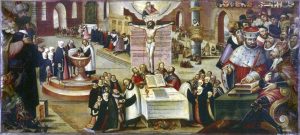“In the meantime, I have considered your wish, and it seems wise to me that I should shortly publish something setting forth (as I have written) a form of the celebration of the mass. Meanwhile, abolish all private masses if you can, or as many [as possible]. But I do not see why we should alter the rest of the ritual, together with the vestments, altars, and holy vessels, since they can be used in a godly way and since one cannot live in the church of God without ceremonies.”*
Martin Luther wrote these words in a letter to Nicholas Hausmann, a pastor in Zwickau, in late October 1523. At this time, Luther and his colleagues had begun to implement reforms to the Christian liturgy in Electoral Saxony. Others sought Luther’s counsel in relation to theological issues related to the Mass and the nature of the Lord’s Supper. Notice he instructed Hausmann to abolish the Private Mass (late medieval priests celebrated private masses in intercession for departed souls) as quickly as possible. However, Luther advocated retaining traditional forms of worship based in the Western Catholic Rite. As he stated here, “one cannot live in the church without ceremonies.”
In December 1523, Luther fulfilled his promise to Nicholas Hausmann when he published his Formulae Missae et Communionis pro Ecclesia Vuittembergensi (An Order of Mass and Communion for the Church at Wittenberg). It often surprises devout Lutherans that Martin Luther wrote his first revision of the late medieval mass in Latin and changed as little as theologically possible. Despite the fact that Luther did publish liturgical works and hymns in German, many early modern Lutheran churches, particularly those in the cities, continued to use the Latin liturgy.**
*Martin Luther, “To Nicholas Hausmann,” in Luther’s Works 48:56.
**Luther, An Order of Mass and Communion for the Church at Wittenberg, LW 53:19-40. On this text see Jon S. Bruss, “The Formulae Missae: Amputating the Dragon’s Tail,” For the Life of the World (Winter 2023): 7-9. Bruss

